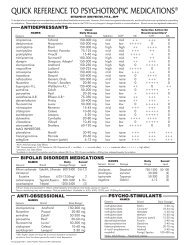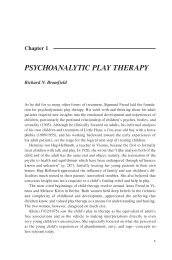IRAQ WAR CLINICIAN GUIDE
Iraq War Clinician's Guide - Network Of Care
Iraq War Clinician's Guide - Network Of Care
Create successful ePaper yourself
Turn your PDF publications into a flip-book with our unique Google optimized e-Paper software.
Iraq War Clinician Guide 37 Treatment<br />
Attend to broadneeds of the person. Wolfe, Keane, and Young (1996) put forward several<br />
suggestions for clinicians serving Persian Gulf War veterans that are also important in the context<br />
of the lraq War. They recommended attention to the broad range of traumatic experience (e.g., as<br />
discussed in Chapter Ill). They similarly recommended broad clinical attention to the impact of<br />
both pre-military and post-military stressors on adjustment. For example, history of trauma places<br />
those exposed to trauma in the war zone at risk for development of PTSD, and in some cases war<br />
experiences will activate emotions experienced during earlier events. Finally, recognition and<br />
referral for assessment of the broad range of physical health concerns and complaints that may be<br />
reported by returning veterans is important. Mental health providers must remember that increased<br />
health symptom reporting is unlikely to be exclusively psychogenic in origin (Proctor et al., 1998).<br />
Methods of Care: Overview<br />
Management of acute stress reactions and problems faced by recently returned veterans are<br />
highlighted below. Methods of care for the lraq War veteran with PTSD will be similar to those<br />
provided to veterans with chronic PTSD.<br />
Education about post-traumatic stress reactions. Education is a key component of care for the<br />
veteran returning from war experience and is intended to improve understanding and recognition<br />
of symptoms, reduce fear and shame about symptoms, and, generally, "normalize" his or her<br />
experience. It should also provide the veteran with a clear understanding of how recovery is<br />
thought to take place, what will happen in treatment, and, as appropriate, the role of medication.<br />
With such understanding, stress reactions may seem more predictable and fears about long-term<br />
effects can be reduced. Education in the context of relatively recent traumatization (weeks or<br />
months) should include the conception that many symptoms are the result of psychobiological<br />
reactions to extreme stress and that, with time, these reactions, in most cases, will diminish.<br />
Reactions should be interpreted as responses to overwhelming stress rather than as personal<br />
weakness or inadequacy. In fact, some recent research (e.g., Steil & Ehlers, 2000) suggests that<br />
survivors' own responses to their stress symptoms will in part determine the degree of distress<br />
associated with those symptoms and whether they will remit. Whether, for example, post-trauma<br />
intrusions cause distress may depend in part on their meaning for the person (e.g., "I'm going<br />
crazy").<br />
Training in coping skills. Returning veterans experiencing recurrent intrusive thoughts and images,<br />
anxiety and panic in response to trauma cues, and feelings of guilt or intense anger are likely to<br />
feel relatively powerless to control their emotions and thoughts. This helpless feeling is in itself a<br />
trauma reminder. Because loss of control is so central to trauma and its attendant emotions,<br />
interventions that restore self-efficacy are especially useful.<br />
Coping skills training is a core element in the repertoire of many VA and Vet Center mental health<br />
providers. Some skills that may be effective in treating lraq War veterans include: anxiety<br />
management (breathing retraining and relaxation), emotional "grounding," anger management,<br />
and communication. However, the days, weeks, and months following return home may pose<br />
specific situational challenges; therefore, a careful assessment of the veteran's current experience<br />
must guide selection of skills. For example, training in communication skills might focus on the<br />
problem experienced by a veteran in expressing positive feelings towards a partner (often<br />
associated with emotional numbing); anger management could help the veteran better respond to<br />
others in the immediate environment who do not support the war.<br />
-----.- .. . . - .-.-- ...... \<br />
-, -.- .. .-<br />
DEPARTMENT OF VETERAhS AFFAIRS<br />
NATIONAL CENTER FOR PTSD




